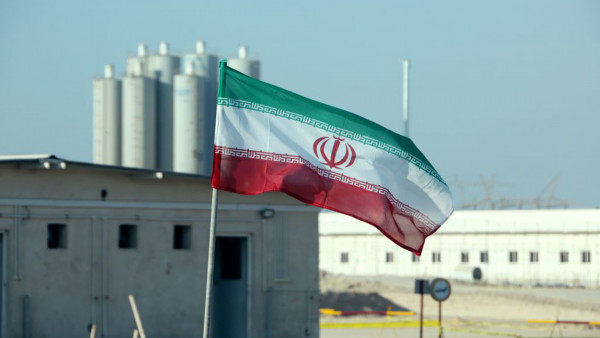Well, that happened fast, didn’t it. Two weeks ago, much of the chatter in the commentariat was about the prospects for a new Iran deal — the revival or revision of the Joint Comprehensive Plan of Action — as a result of the international negotiations with Tehran in Vienna. Would it happen or wouldn’t it? If it happened, would the deal be worth the candle? And if it did not, what was Plan B? Now we have Ukraine.
The negotiations continue, of course. These things tend to have a life of their own, even if the benefits have become less apparent. Ali Bagheri Kani, the chief Iranian negotiator, has been talking up the chances of an agreement, but also suggesting that time is running out. And he has been ambivalent about the US demand to link a deal with the fate of American and other Western citizens whom Tehran has effectively seized as hostages. At the same time, Iran continues to expand work on its nuclear facilities and obstruct International Atomic Energy Agency access to sensitive sites and materials — particularly any which might confirm Tehran had a nuclear weapons program as early as the late 1990s. The plan is transparently clear: Use the current crisis to ratchet up the political pressure on the US and its allies to give in to Iranian demands, particularly on the timing and scale of sanctions relief.
The original deal in 2015 was a compromise. It agreed to treat a time-limited investigation into Iran’s previous weaponization activities as a separate issue, thereby turning a blind eye to what we all knew at the time was the real purpose of the nuclear program. It also treated Iran’s malevolent non-nuclear activities in the wider region as a separate issue in the pious hope that an agreement would lead Iran to moderate its behavior and become a more normal state. And it provided Iran with an immediate funding boost, through billions of dollars of unfrozen assets. Apologists said this money would help Iran address its severe economic problems. It did not. Those problems remain acute and structural — the result for the most part of mismanagement, endemic corruption and a bizarre ideology of sacralized suffering (as long as that suffering does not affect the military-clerical elites and their vacuously entitled children). Meanwhile, Hezbollah, the Houthis and the Tehran-aligned Iraqi militias continue to receive substantial funding for their murderously destabilizing activities.
That deal was concluded against the background of the expanding conflict in Syria and the Russian annexation of Crimea. That was bad enough. This time it is worse. Iranian-backed forces across the region have attacked Saudi Arabia, the UAE and Israel in the past few months. Iran-aligned militias — with the catastrophic former Prime Minister Nouri Al-Maliki almost certainly pulling the strings, with Tehran’s encouragement, from behind the scenes — have sought to frustrate the will of Iraqi voters by denying Muqtada Al-Sadr the chance to form a government without them and are now seeking to reduce the influence of the Kurds by overturning a long-standing agreement on oil production and revenue sharing. That way lies further misery for Iraq.
And above all we have now seen the brutal Russian invasion of Ukraine as a whole in an attempt to turn the country into a second Belarus; effectively a satellite of Moscow, which has made clear its desire to reclaim what it regards as Great, White and Little Russia as a single civilizational state — essentially a neo-czarist imperium.
A rebooted JCPOA that allows Tehran more latitude would be bad for the US, for Europe and certainly for Iran’s neighbors.
Sir John Jenkins
This conflict has united the EU and NATO in a way we have not seen for years. The former, after some hesitation, has at last followed the lead of the UK, the Baltic states and Poland in supplying weapons and other material support to Kyiv and, with the US, has imposed massive sanctions on Moscow. NATO has spoken with one voice. Germany, without which there is no serious European defense against Russia, has suspended the Nord Stream 2 project and revised its entire defense doctrine overnight. Sweden and Finland have suggested they will abandon their long-standing neutrality and apply for membership of NATO. So have others. Turkey has suggested it will invoke the Montreux Convention, in effect to deny Russian naval forces passage to and from the Black Sea. Japan, South Korea and even Switzerland and Singapore have imposed restrictive economic measures.
This is serious. We are now clearly seeing the material impact of something that was hiding in plain sight but many Europeans, in particular, chose to ignore: The world is not the comforting place you would like it to be. It is often harsh and unwelcoming, where soft power only works if backed by hard force — and the sort of political will and courage shown by the Ukrainian president and his government.
This is bound to have an impact on the relationship we all have with Iran. Iran also thinks it is a civilizational state entitled to do what it likes in what it regards as its own region. Like Russia, Iran thinks its massive energy reserves give it special leverage over the West and its regional competitors. Russia exalts its status as the “third Rome,” the successor to the Eastern Roman Empire and protector of Christian Orthodoxy. In an analogous way, Iran believes its position as the leading Shiite power gives it a special place within Islam as a whole. That might help explain why the two powers seem to get along so well, in spite of a centuries-old history of conflict.
The negotiators in Vienna have said that none of this should be allowed to affect the current negotiations. I can see that everyone might want a swift conclusion, simply in order to have one less problem to manage internationally. That might mean more concessions to Iran. But it will simply store up problems for the future. If Russia is allowed to get away with its brutal and lawless expansionism — in a way Iraq was not allowed to do 40 years ago — then what is to prevent Iran believing it can do the same? A rebooted JCPOA that allows Iran more latitude will simply reinforce this feeling. That would be bad for the US, bad for Europe and certainly bad for Iran’s neighbors.
And with the best will in the world, we are all going to have to choose a side. Whatever eventually happens in Ukraine — and I assume an enraged Russia will now double down on the use of maximum force, as we are already seeing in Kharkiv — the dividing lines are becoming clear. Europe has woken up to its weakness. NATO is circling the wagons and may well now expand on its northern and perhaps southeastern fronts. And the Biden administration is discovering what international leadership really means. A Russian victory in Ukraine would be read in Tehran — and Beijing — as an omen. On the other hand, a unified, powerful and sustained Western response, which imposes massive costs and just perhaps prevents a decisive Ukrainian defeat, would act as a powerful deterrent to further adventurism by Iran, as well as much larger powers.
A large part of this response will need to be a radical rethink of energy policies. Oil has spiked recently, of course, and is now trading at more than $100 a barrel. That may seem like a windfall for producers, but it will be taken as a warning by consumers. We saw in the 1970s how a rapid increase in energy prices produced a powerful counter-reaction. That may well happen again.
The wider consequences are unpredictable, but they are likely to be huge. The world is changing rapidly. We are already in a new cold war and Iran is going to be part of this, so is the wider Gulf. If you think Iran is a problem, then you should also think what is happening in Ukraine has a powerful bearing on that problem. Globalization may be in trouble, but it is in trouble because of its own success. Global supply chains may now be rewired, but regional conflicts will continue to have global consequences. They can no longer be treated simply as isolated events.
As the admirable Fiona Hill recently warned, the international rules-based order is now at risk. We all have a stake in its survival. Without it, Iran, like Russia, will think it can do what it likes. And for the Gulf, whether individual countries wish to take a position or not, they will be directly affected by economic turmoil and the impact on energy, tourism and food security. There will be no shelter from the approaching storm, whether we get a new JCPOA or not.
By: Sir John Jenkins – a senior fellow at Policy Exchange. Until December 2017, he was corresponding director (Middle East) at the International Institute for Strategic Studies, based in Manama, Bahrain, and was a senior fellow at Yale University’s Jackson Institute for Global Affairs. He was the British ambassador to Saudi Arabia until January 2015.
Source: Arab News
***Show us some LOVE by sharing it!***



